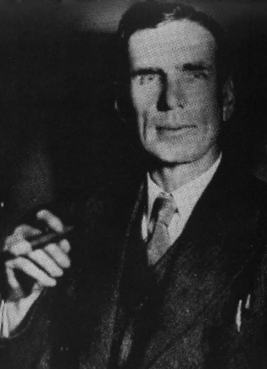
If the tale of the Scottsboro Boys can be said to have heroes, there is no person more deserving of the label than James E. Horton, the judge who presided over Haywood Patterson's second trial in Decatur. Judge Horton's decision to set aside the verdict and death sentence of Haywood Patterson, made despite warnings that ordering a new trial for Patterson would end his career as an elected circuit judge, was a remarkable act of courage and principle.
James Horton's father was an Alabama probate judge, planter, and former slaveholder; his mother was the daughter of a confederate general. Horton gave up pursuit of a medical degree for a law degree, which he received from Cumberland University in Lebanon, Tennessee in 1899. He entered private practice, but left it in 1910 for a six-year career in the Alabama legislature. In 1922, he was elected circuit judge. When the Scottsboro cases were transferred to his Decatur courtroom in 1933, Horton was in the fifth year of his second six-year term.
The announcement that the gracious and easygoing Horton would take on the controversial Scottsboro case was generally greeted with enthusiasm. Alabama papers praised the judge's "unusually equable nature, great legal ability, and fairness." Prosecutor Thomas Knight said that he thought Horton "would make an excellent judge."
During the course of the contentious trial of Haywood Patterson, Horton rarely raised his soft, conversational voice. Although his rulings neither consistently favored the prosecution or the defense, Horton made it abundantly clear thate he stood on the side of fair process and fair treatment for all, regardless of color. That alone made Horton a liberal by Alabama standards. Horton raised many local eyebrows when he warmly shook the hands of two black reporters who he had helped secure seats in his courtroom. His full anger only showed once in the trial. On the third day of the trial, after hearing reports of plans for a lynching, the judge raised his voice to a near shout and denounced would-be lynchers as "cowardly murderers." Horton, saying that he had "absolutely no patience with the mob spirit," announced that he had ordered police guards to shoot to kill if necessary in defense of the black prisoners.
Horton, along with virtually every other white person in Alabama, initially assumed that the Scottsboro defendants were probably guilty, but began to have doubts after listening to Price's contradiction-riddled testimony. His doubts grew to a conviction that the defendants were innocent after hearing the medical testimony of one examining physician, Dr. Bridges, and meeting privately with a second, Dr. John Lynch. Dr. Lynch, initially on the state's witness list, was dropped at the last moment because, the prosecution said, his testimony would only be redundant. Lynch approached Horton shortly thereafter, and the two talked in the men's room of the Decatur courthouse, with a bailiff guarding the door. Lynch told Horton that he was convinced the girls were lying, and when he told them that directly, they merely laughed at him. Horton urged Lynch to testify, but did not order him to do so, respectful of the young doctor's concern that testimony in favor of the defense would end any chance he might have to build a successful medical career in northern Alabama.
On June 22, 1933, when Horton convened court in his hometown of Athens, Alabama, there was little optimism in the defense camp that their motion to set aside Patterson's guilty verdict would be granted. Horton, however, shocked those assembled by announcing that he would grant the motion on the ground that the jury's verdict was not supported by substantial evidence. In a careful, point-by-point review of the medical testimony and that offered by other prosecution witnesses, Horton found Price's testimony to be "not only uncorroborated, but it also bears on its face indications of improbabilty and is contradicted by other evidence."
In May of 1934, Horton, who had been unopposed in his previous election to the bench, faced two primary opponents. He finished second in the primary, then ran hard in the general election, but lost 9,416 to 6,856. No one doubted but that his defeat was attributable entirely to his decision in the Scottsboro case. Horton retired from politics, and devoted his remaining years to private practice and his plantation. When asked about his decision in a 1966 interview, Horton quoted what he said was a phrase often-repeated in the Horton family, "fiat justicia ruat colelum" -- let justice be done though the heavens may fall. Horton died in 1973 at the age of ninety-five.
